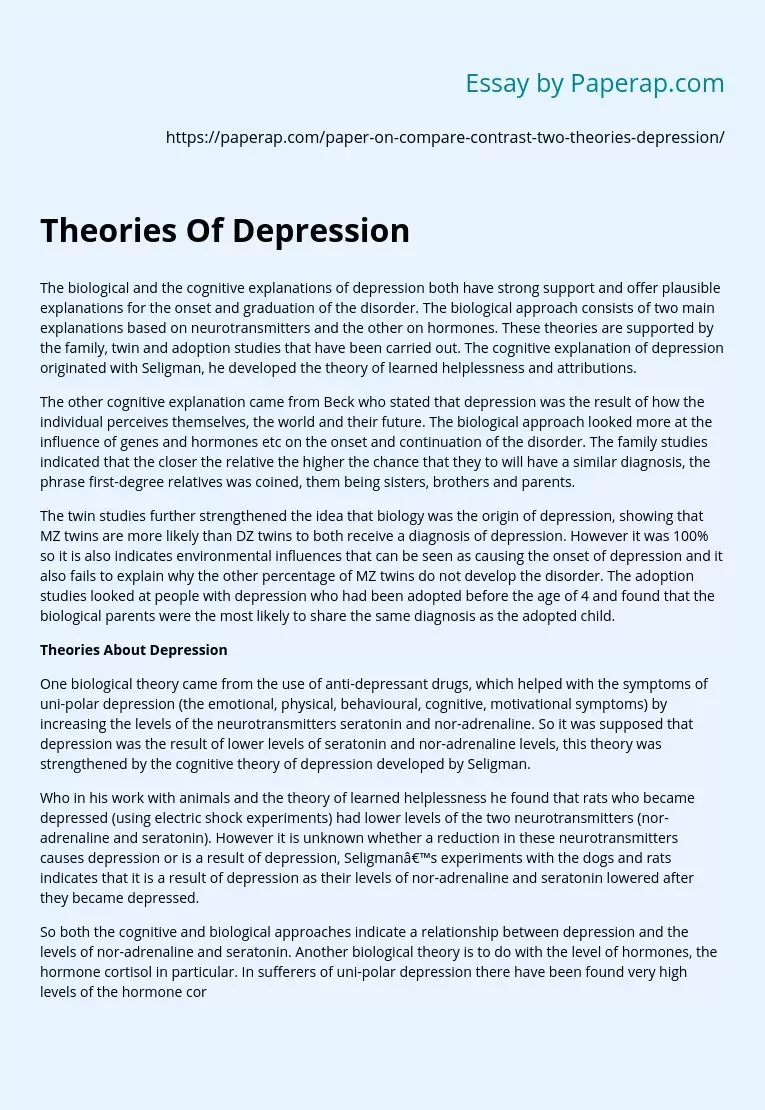Theories Of Depression
The biological and the cognitive explanations of depression both have strong support and offer plausible explanations for the onset and graduation of the disorder. The biological approach consists of two main explanations based on neurotransmitters and the other on hormones. These theories are supported by the family, twin and adoption studies that have been carried out. The cognitive explanation of depression originated with Seligman, he developed the theory of learned helplessness and attributions.
The other cognitive explanation came from Beck who stated that depression was the result of how the individual perceives themselves, the world and their future.
The biological approach looked more at the influence of genes and hormones etc on the onset and continuation of the disorder. The family studies indicated that the closer the relative the higher the chance that they to will have a similar diagnosis, the phrase first-degree relatives was coined, them being sisters, brothers and parents.
The twin studies further strengthened the idea that biology was the origin of depression, showing that MZ twins are more likely than DZ twins to both receive a diagnosis of depression.
However it was 100% so it is also indicates environmental influences that can be seen as causing the onset of depression and it also fails to explain why the other percentage of MZ twins do not develop the disorder. The adoption studies looked at people with depression who had been adopted before the age of 4 and found that the biological parents were the most likely to share the same diagnosis as the adopted child.
Theories About Depression
One biological theory came from the use of anti-depressant drugs, which helped with the symptoms of uni-polar depression (the emotional, physical, behavioural, cognitive, motivational symptoms) by increasing the levels of the neurotransmitters seratonin and nor-adrenaline. So it was supposed that depression was the result of lower levels of seratonin and nor-adrenaline levels, this theory was strengthened by the cognitive theory of depression developed by Seligman.
Who in his work with animals and the theory of learned helplessness he found that rats who became depressed (using electric shock experiments) had lower levels of the two neurotransmitters (nor-adrenaline and seratonin). However it is unknown whether a reduction in these neurotransmitters causes depression or is a result of depression, Seligman’s experiments with the dogs and rats indicates that it is a result of depression as their levels of nor-adrenaline and seratonin lowered after they became depressed.
So both the cognitive and biological approaches indicate a relationship between depression and the levels of nor-adrenaline and seratonin. Another biological theory is to do with the level of hormones, the hormone cortisol in particular. In sufferers of uni-polar depression there have been found very high levels of the hormone cortisol, and so it has been suggested that this hormone could be linked with the onset of depression. The hormone cortisol has also been linked with stress, when people become stressed the body has been shown to produce more of this hormone.
This does fit in as depression has been linked with traumatic or stressful experiences. The cognitive approach makes a link between stressful experiences such as the loss of a loved one and depression. Unlike the biological approach the cognitive explanation focuses on the way the person thinks as being the cause of depression. Seligman developed the theory of attributions depression is dependant upon the explanations we make about our behaviour and the situation. He developed the idea of internal, stable and global attributions. So depending on how the person perceives the stressful experience.
For example if a loved one were to pass away and the person makes internal/stable/global attributions for the loss they will probably become depressed. So both the biological and cognitive approaches acknowledge the role of traumatic experiences with depression. However some people have a stressful experience and do not develop depression so cortisol could just be a symptom of depression rather than a cause. Beck’s cognitive explanation of depression however did not look at experiences and how we explain them and our role in them, as both Seligman’s and the biological approach did.
Beck instead looked at how a negative outlook on life in general rather than specific stressful situations can cause depression. He stated that a negative outlook could cause errors in the persons thought processing, such as arbitrary inference, selective abstraction and over-generalisation. Beck also located a negative thought triad, which like the biological approach also does, provides an explanation for why depression progresses as it does in many people.
The levels of the neurotransmitters have been sown that they may be lowered as a result of the person becoming depressed if this is the case then it is likely that the lowering of these neurotransmitters (nor-adrenaline and seratonin) could explain why in many people depression grows and becomes worse. Beck’s negative thought triad shows that negatives views of the self can lead to negative views of the world and then the future thus the individual sees things as gradually more hopeless and the depression becomes worse.
Theories Of Depression. (2019, Dec 05). Retrieved from https://paperap.com/paper-on-compare-contrast-two-theories-depression/

